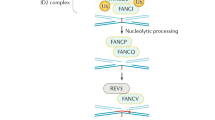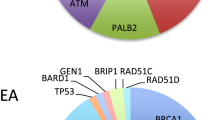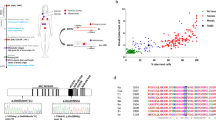Abstract
The effectiveness of cancer radiotherapy is compromised by the small proportion (approximately 5%) of patients who sustain severe normal tissue damage after standard radiotherapy treatments. Predictive tests are required to identify these highly radiosensitive cases. Patients with the rare, recessively inherited, cancer-prone syndrome ataxia-telangiectasia (A-T) sustain extremely severe normal tissue necrosis after radiotherapy and their cultured cells are also highly radiosensitive. Clinically normal carriers (heterozygotes) of the A-T gene have an increased risk of breast cancer, account for approximately 4% of all breast cancer cases and show a modest increase in cellular radiosensitivity in vitro. It has been suggested that a substantial proportion of highly radiosensitive (HR) breast cancer patients may be A-T heterozygotes, and that screening for mutations in the A-T gene could be used as a predictive test. We have tested this hypothesis in a group of cancer patients who showed adverse reactions to radiotherapy. Sixteen HR breast cancer patients showing mainly acute reactions (and seven HR patients with other cancers) were tested for ATM mutations using the restriction endonuclease fingerprinting assay. No mutations typical of those found in obligate A-T heterozygotes were detected. If the estimate that 4% of breast cancer cases are A-T gene carriers is correct, then ATM mutations do not confer clinical radiosensitivity. These early results suggest that screening for ATM mutations in cancer patients may not be of value in predicting adverse reactions.
This is a preview of subscription content, access via your institution
Access options
Subscribe to this journal
Receive 24 print issues and online access
$259.00 per year
only $10.79 per issue
Buy this article
- Purchase on Springer Link
- Instant access to full article PDF
Prices may be subject to local taxes which are calculated during checkout
Similar content being viewed by others
Author information
Authors and Affiliations
Rights and permissions
About this article
Cite this article
Appleby, J., Barber, J., Levine, E. et al. Absence of mutations in the ATM gene in breast cancer patients with severe responses to radiotherapy. Br J Cancer 76, 1546–1549 (1997). https://doi.org/10.1038/bjc.1997.593
Issue Date:
DOI: https://doi.org/10.1038/bjc.1997.593
This article is cited by
-
DNA damage response and hematological malignancy
International Journal of Hematology (2017)
-
Genetic susceptibility to cutaneous radiation injury
Archives of Dermatological Research (2017)
-
Association of single nucleotide polymorphisms in the genes ATM, GSTP1, SOD2, TGFB1, XPD and XRCC1 with risk of severe erythema after breast conserving radiotherapy
Radiation Oncology (2012)
-
Aberrant CDKN1A transcriptional response associates with abnormal sensitivity to radiation treatment
British Journal of Cancer (2008)
-
Preventing or reducing late side effects of radiation therapy: radiobiology meets molecular pathology
Nature Reviews Cancer (2006)



